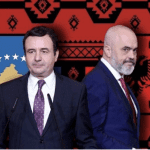The implosion of Albania’s main opposition Democratic Party into the ugly scenes of clashes at the party’s headquarters in Tirana on Saturday is a bad sign not just for the party itself, but for the entire country.
For democracy to work, voters need an opposition that offers a viable alternative to the government. Democracy also needs institutional approaches in order for it to function. Clear internal party democracy is one such approach. The party as an institution over any single individual is another.
As things stand, many Democratic Party supporters have dug two big trenches behind two individuals, Sali Berisha and Lulzim Basha. The two have made it clear there will be no compromise going forward. This either with me or against me mentality not only weakens the party, it does a disservice to all of its voters – and the Albanian public in general.
That’s because this divisive approach orphans a large group of Albanians who simply want a strong and united opposition to keep the government in check.
The opposition in Albania lost the general elections for an unprecedented third-time in a row. Of course, there were well-documented irregularities and undemocratic pressures used by the ruling Socialist Party, which amounted to an advantage unseen since the 1990s in Albania. But Democrats and their leadership should take their part of the blame for losing the elections. Mr. Basha’s leadership is forever tainted by that loss and by wrong decisions, such as abandoning parliament and local elections.
Sali Berisha presents other problems. He is far more popular than Basha among the membership, but less popular with the public at large with his ever-presence in Albanian politics and now the American designation as “a corrupt official.” Yet, Berisha is not simply capitalizing on his own supporters, he is using a large part, if not the majority, of the party that wants Basha gone. Not everyone sees Mr. Berisha as a long-term answer, but they figure only someone with his gravitas can dislodge Basha in the absence of clear internal party democracy.
It is impossible to tell who has the upper hand based on faction-conducted votes due to lack of independent supervision, but many polls show the Berisha and his circle represent a lot more activists and members than does Basha. But it is Basha who enjoys the legal position as head of the opposition, according to the Albanian state.
For now, the party is clearly heading for a split. Legally, it might not be possible for the challengers to take over, as courts are likely going to draw out the case in perpetuity, further weakening the party. Meanwhile, both sides are expelling and ejecting the other, as if the opposition has the luxury of shunning able and willing members of parliament, politicians and professionals.
The solution is simple — put the party leadership to a new vote that can be independently monitored and accepted by all. Berisha’s supporters would be happy with that — they have scheduled such vote for March — but Basha refuses to participate. That says a lot.
There is a clear winner out of this mess, and that is the current government of Prime Minister Edi Rama, which becomes ever more powerful and ever more domineering – and happy to rule with an absent opposition.
Pluralism seems to be out of fashion in the corridors of power in Albania – a regional trend for that matter.










